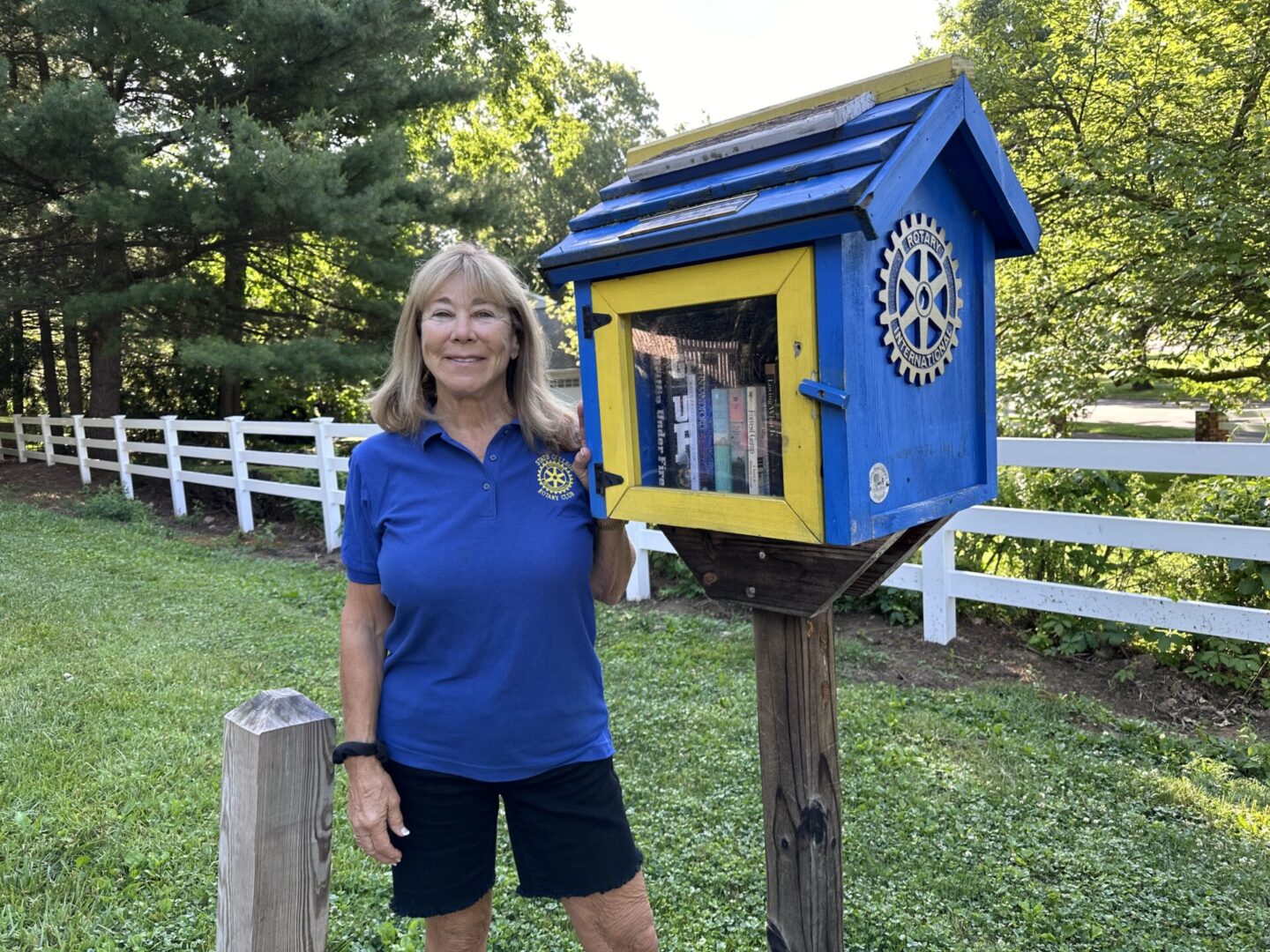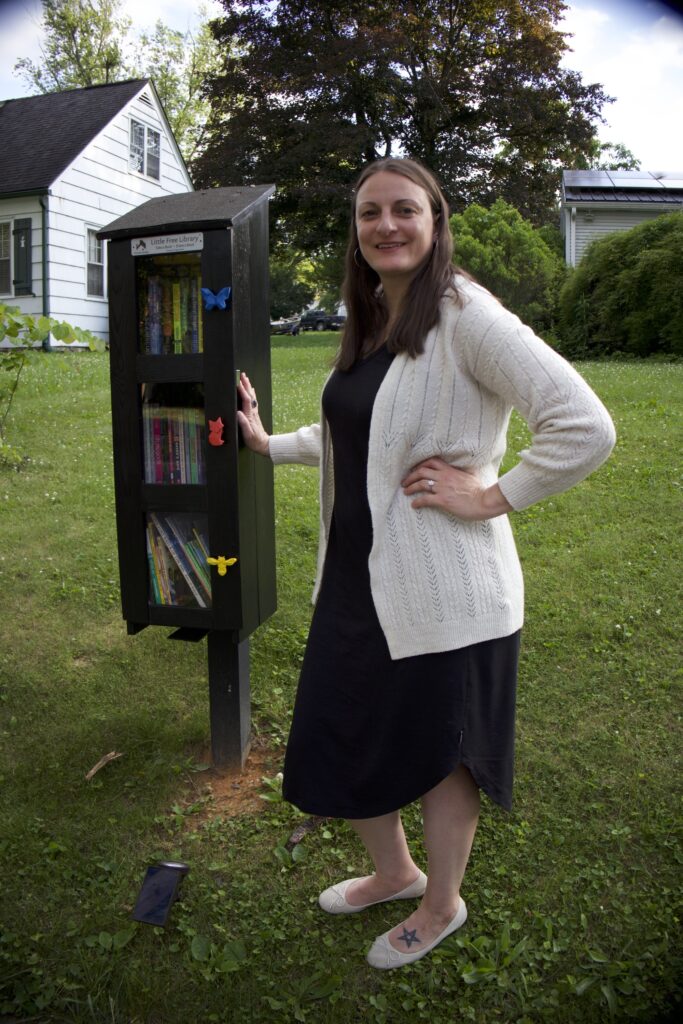“Take a Book, Share a Book” at Little Free Libraries | Town&Gown

It’s every avid reader’s dream: free books, available 24 hours a day, seven days a week; no library card required; and best of all, no late fees—in fact, you don’t have to return the books at all.
Of course, I’m talking about Little Free Libraries, the post-mounted, weatherproof boxes often found outside a house or in a local park, filled with books to take home. A simple LFL resembles a large birdhouse and has a Plexiglas cabinet door, but just like the books they contain, the boxes are often designed to inspire the imagination – they may be shaped like owls, phone booths or rocket ships, or be made from repurposed grandfather clocks, canoes or newspaper vending machines.
According to LittleFreeLibrary.org, the first book-sharing box was set up in Hudson, Wisconsin, in 2009. Today, there are over 175,000 registered LFLs worldwide.
Here in Centre County, there are about fifty registered LFLs, each owned and operated by local “custodians” – individuals or organizations that set up and maintain the boxes and help manage the contents.
When the custodian purchases an identification badge from the Little Free Library organization, their box is officially registered and appears on a world map that can be accessed through the LFL app or website.
Signs encourage visitors to “take a book and share a book,” but beyond basic expectations of common courtesy, there are no formal rules. Local administrators say they just want their fellow citizens to enjoy using the libraries as much as they enjoy maintaining them.
Tiffany Mathias
South Pugh Street, State College
She loves books and she loves people, so for Tiffany Mathias, the idea of owning her own LFL was a no-brainer, except for one thing: There was already a similar book-sharing box a few doors down on South Pugh Street.
“I was hesitant to put it up,” she says, “but it attracts a surprising amount of traffic. It’s really popular. Even our neighbors love it.”
Mathias built the tall black structure a year ago with the help of his father-in-law, who built it to her specifications. This included three shelves: an upper shelf for adult books, a middle shelf for young adult books and a lower shelf for children’s books.
“I wanted to make it as kid-friendly as possible, so I ordered doorknobs from Etsy that depicted a rabbit, a fox, a dinosaur and a butterfly,” she says. “I just wanted to make it inviting so people would enjoy it.”
Mathias enjoys the interaction her box has sparked with strangers and neighbors alike. She says the location on a thoroughfare near downtown draws many different people to her library, from dog owners and students on their way to class to football weekend visitors who drive by to pick up a book for the ride home.
“It was really rewarding because I got to meet people who wouldn’t otherwise come along and participate,” she says. “It gave me a lot of joy that way.”
Mathias says she tries to keep her LFL filled with about thirty books at a time, and she checks the box regularly to see what might need restocking. Sometimes she buys replacement children’s books at the Schlow Centre Region Library, where they sell used books for as little as 25 cents a piece. She also enjoys seeing what people have put in the box.
“We’ve gotten some really great stuff,” she says, saying she’s found things like comic books, stickers, handmade postcards and bookmarks that people have put in the box to share.
“The most unique thing in there right now is a book from the Koran, which I think is pretty cool,” she says. “It’s so nice that I have a community that expands the perspective of the box.”

Heather Baumgarten
“Miss Madeline’s Little Free Library”
Severn Drive, State College
A quick look at the map on the LFL website shows that many of the libraries have names. In Heather Baumgarten’s case, her “Miss Madeline’s Little Free Library” is named after her dear friend, writer Madeline Sharples.
The LFL was a birthday gift from Baumgarten’s husband; he had an Amish man build it in 2020. Painting and installing it became a pandemic project for the whole family, Baumgarten says, when her adult children and grandchildren came to visit for a few weeks over the summer.
Painted in a cheerful mint green and accented with an enchanting floral stencil pattern, the box was installed in front of Baumgarten’s Park Forest home in August 2020 to great acclaim and social distancing.
“People saw us painting it and preparing it, and I think they were excited,” she says. “So we had a big opening celebration; we had tables set up in the courtyard where there were free books, bookmarks and treats for the kids.”
The grandmother of four says one of her goals as an LFL caregiver is to encourage children to spend their time with books rather than screens.
“We want to teach children that reading and adventures in books are fun. For me, that’s a big deal,” she says.
After nearly four years, Baumgarten says her LFL is well-used, both by people picking books off the shelves and by people bringing books in. She takes inventory of the box about once a week. Thanks to the many book donations she receives, she rarely has to restock the shelves, which are usually filled with a variety of titles, from cookbooks to religious titles to plenty of adult fiction. However, she says, it’s difficult to keep children’s books in stock, so she occasionally supplements the inventory with purchases at Goodwill.
Baumgarten says she enjoys watching people of all ages find something they like in her library. She can often watch them from her window, but if she happens to be outside when they pass by, she says, “The conversations you have are so positive. They lead from one topic to the next, and I think that creates a sense of unity among us. That’s so important these days.”
Mary Kay Fultz
“Baileys Bibliotech”
Bellefonte
Mary Kay Fultz built and installed her own LFL — named “Bailey’s Bibliotech” in honor of her dog — in her Bellefonte home about seven years ago. Her library continues to draw frequent visitors and inspired a neighbor to build one of her own, she says.
Fultz found the experience as a flight attendant so rewarding that she incorporated LFLs into her work as regional vice president of Skills of Central PA, a nonprofit organization that supports individuals with mental, intellectual or developmental disabilities.
A few years ago, Fultz had some participants in one of Skills’ adult education programs build an LFL in a workshop in Huntingdon. She soon decided to develop the idea further, and Skills began accepting book donations at its adult education facility on Benner Pike in State College. Participants in the program use the donated books to replenish supplies at registered LFLs throughout Centre County on a weekly basis.
“It’s a great opportunity for our adult education staff to give back to the community,” Fultz said. “I think a lot of people use the Little Free Libraries. I think it’s a great thing.”
She says there is currently an LFL outside one of the skills group homes in State College, and she hopes to eventually have one outside every skills group home in her area.
Rotary University of State College
Various locations in State College
The State College Rotary Club is another organization that serves as an LFL steward.
According to board member Jeane Singer, the organization first used a community grant in 2015 to purchase and install six LFLs. The boxes have been placed in Sidney Friedman Parklet, Millbrook Marsh, Holmes-Foster Park, Lederer Park, Orchard Park and Park Forest Elementary School. The organization has also worked with the high school’s Interact Club to support its efforts to install LFLs at other locations.
Before the State College Rotary Club received approval to install its first LFLs, Singer says she had to take one of the boxes to a State College Borough Council meeting to show them what they were.
“They were brand new. We were really the first to put them up here in a public space,” she says.
After nine years, Singer says the libraries are largely self-sustaining, at least in terms of what’s on the shelves. She still checks on them regularly and has found that different locations attract different kinds of reading material: magazines at Orchard Park, religious books at Holmes-Foster Park and science and nature books at Millbrook Marsh.
The boxes need occasional maintenance, such as touching up the paint, and unfortunately sometimes vandalism occurs, so they need to be repaired or cleaned, she says.
Overall, Singer says: “It’s a wonderful program.” T&G
Karen Walker is a freelance writer in State College.



